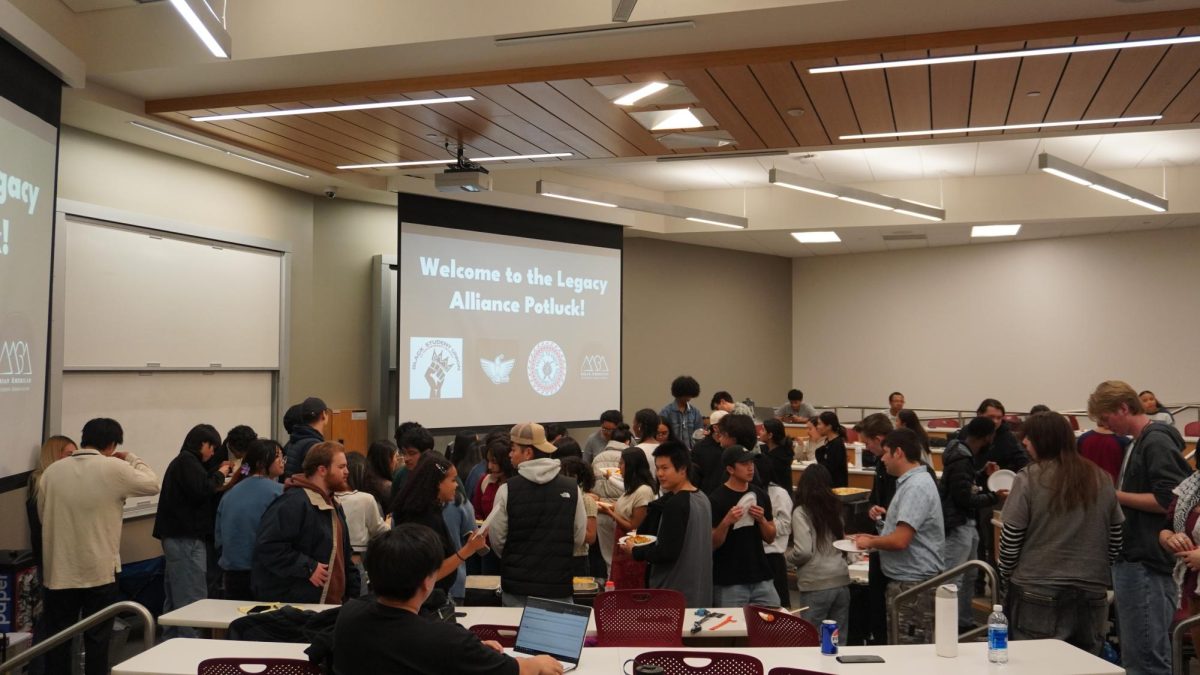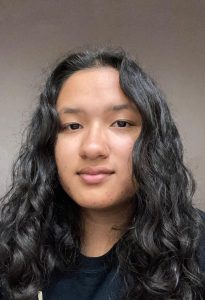In the wake of H.B. 261 and the subsequent closure and de-funding of various student centers and groups on campus related to DEI, five student groups at the University of Utah have reignited a coalition called the Legacy Alliance.
The Legacy Alliance involves five student groups: the Black Student Union (BSU), Asian American Student Association (AASA), Mecha, Pacific Islander Student Association (PISA) and the Inter-Tribal Student Association (ITSA). On Thursday, Nov. 21 the coalition hosted a “solidarity potluck.”
According to AASA, around 110 students, including student leaders of the various clubs, were in attendance.
In an Instagram post promoting the event, the student groups cited the need “to come together in support of each other” in light of the “challenges and obstacles” the groups are facing because of H.B. 261. The post also welcomed any students to attend and bring food.
Reigniting the Legacy Alliance
The event began with a presentation by student leaders. First, two members of Mecha introduced the Legacy Alliance. The introduction was followed by presentations from the leaders from BSU, AASA, Mecha and PISA. ITSA was unable to attend the event.
The students from Mecha explained the Legacy Alliance, which was initially formed in the 2010s to demand more support for minority students attending the U. Their biggest accomplishment was the 13 Initiatives, a list of demands related to racial justice that the U committed to fulfilling in 2016.
One of the initiatives was to create the Center for Ethnic Student Affairs, which would later become the Center for Equity and Student Belonging. It also demanded financial support for ethnic student groups through high school conferences and scholarships, the creation of the School for Cultural and Social Transformation and the creation of coalitions including the Student Diversity Council and Diversity Coalition Group.

“We’re not just here eating good food, hanging out with awesome people; this should be grounded in our history of political activism,” Chris Loera-Peña, one of the presenters for Mecha, said. “I don’t think we should lose any hope because this thing that we’re having today is like the rebirth or revival of the Legacy Alliance, which won these things initially … if we keep organizing alongside each other … I know for sure we can win all these things back and even more.”
The introduction of the Legacy Alliance was followed by presentations by the BSU, AASA, Mecha and PISA. Leaders from each of the student groups introduced themselves, other leadership officers and the missions of each of their organizations.
In her presentation, President of PISA Alisi Fihaki said the Pacific Islander population makes up less than one percent of the student body on campus. She expressed the importance of having a voice on campus in light of this. She also encouraged students to get involved and attend events, including the Utah Pasifika Intercollegiate Association’s annual showcase, which will take place in March.
“Come join us in everything and anything,” Fihaki said. “Once you are with us, you’re part of the family.”
After the presentation, students were encouraged to line up for food brought by student groups and guests. The event involved music, food and community as students mingled and spent time with each other.

Importance of the Legacy Alliance
Sandrine Mimche, a second-year student majoring in political science and economics, is the vice president of BSU. She said bringing the Legacy Alliance together at this moment is a way for the student groups to rely on each other in the wake of H.B. 261.
“We’re continuing a commitment to stay as a community because we can really rely on each other,” she said.
After H.B. 261 led to these student groups losing sponsorship ties with the U, Mimche said the clubs that were defunded had informal meetings every week to support each other as they navigated the process of re-organizing and funding events.
She said she brought forth the idea for the potluck at one of these meetings, thinking it would be a good way to demonstrate the solidarity and shared goals between the clubs.
“I think there’s this weird notion that BSU and AASA are super separate, or BSU and Mecha are super separate, or BSU and PISA are super separate, when in reality, we’re all in community,” Mimche said. “I wanted each of our clubs to kind of know about the others and what we do and how we work together.”
Mimche said the bringing together of food from different cultures for this potluck was symbolic of these goals. Each of the clubs organizing the event brought food.
“We had food from different cultures, people trying food from different cultures,” Mimche said. “I think it was a really beautiful way to kind of show our unity.”
Mimche also encouraged students to show up to events organized by BSU and other student organizations, especially as evidence of high attendance may help their ability to keep doing events in the future.
“Even when we were sponsored, we got judged on our attendance numbers … that data is still really important in our future outcomes,” Mimche said. “’Should we keep the BSU? Should we fund them? Are they worth funding?’ I think a big wish is showing that there is a community here.”
Community and Continued Advocacy
Benji Park is a first-year student majoring in economics and sociology. He’s also a member of Mecha and attended the potluck. He described the event as creating a sense of community.
“I thought it was a great community building event, building connections between these groups that have that historical tie together,” Park said.
Park also said the event was a good way to start building a collaboration between the groups to fight back against the effects of H.B. 261.
“Bringing back the Legacy Alliance was spurred by Mecha thinking about how we can organize to fight for DEI on campus, and think about what groups are affected and who could be interested in that,” Park said. “It’s a good way to start building the movement.”
Alex Tokita is a fourth-year student majoring in computer science and the president of AASA. He said the Legacy Alliance brings together groups that have similar struggles and goals and gives them more power by allowing them to act as a ”cohesive force.”
“The Legacy Alliance is all about bringing together people, bringing together groups that have traditionally been underrepresented here on campus and have traditionally worked together to fight for common things that they value, like spaces on campus, for funding and just for more recognition by the university,” Tokita said.
Tokita said the groups involved in the Legacy Alliance were all previously under the Center for Equity and Student Belonging and recognized as the core affinity groups at the U.
In light of H.B. 261, the student leaders thought it would be a good idea to re-strengthen the Legacy Alliance. Tokita described the potluck as a “kick-start” to this goal.
“[The purpose of the potluck is] to announce to the wider audience we’re in this fight together,” Tokita said. “And also we wanted to bring together our communities, because it’s kind of a hard time for a lot of people with H.B. 261 and then all the stuff going on around in the world. We just wanted to make a positive event with all of us together.”
Each of the clubs involved in the Legacy Alliance are active on Instagram and regularly share posts with upcoming events.
Black Student Union: @uofubsu
Asian American Student Association: @aasauofu
Mecha: @mechadeuofu
Pacific Islander Student Association: @uofu.pisa
Inter-Tribal Student Association: @uofu_itsa




Raina • Dec 6, 2024 at 10:31 am
Love to see it!!
Elizabeth • Dec 5, 2024 at 10:54 am
any Jewish kids? Or are they banned ?